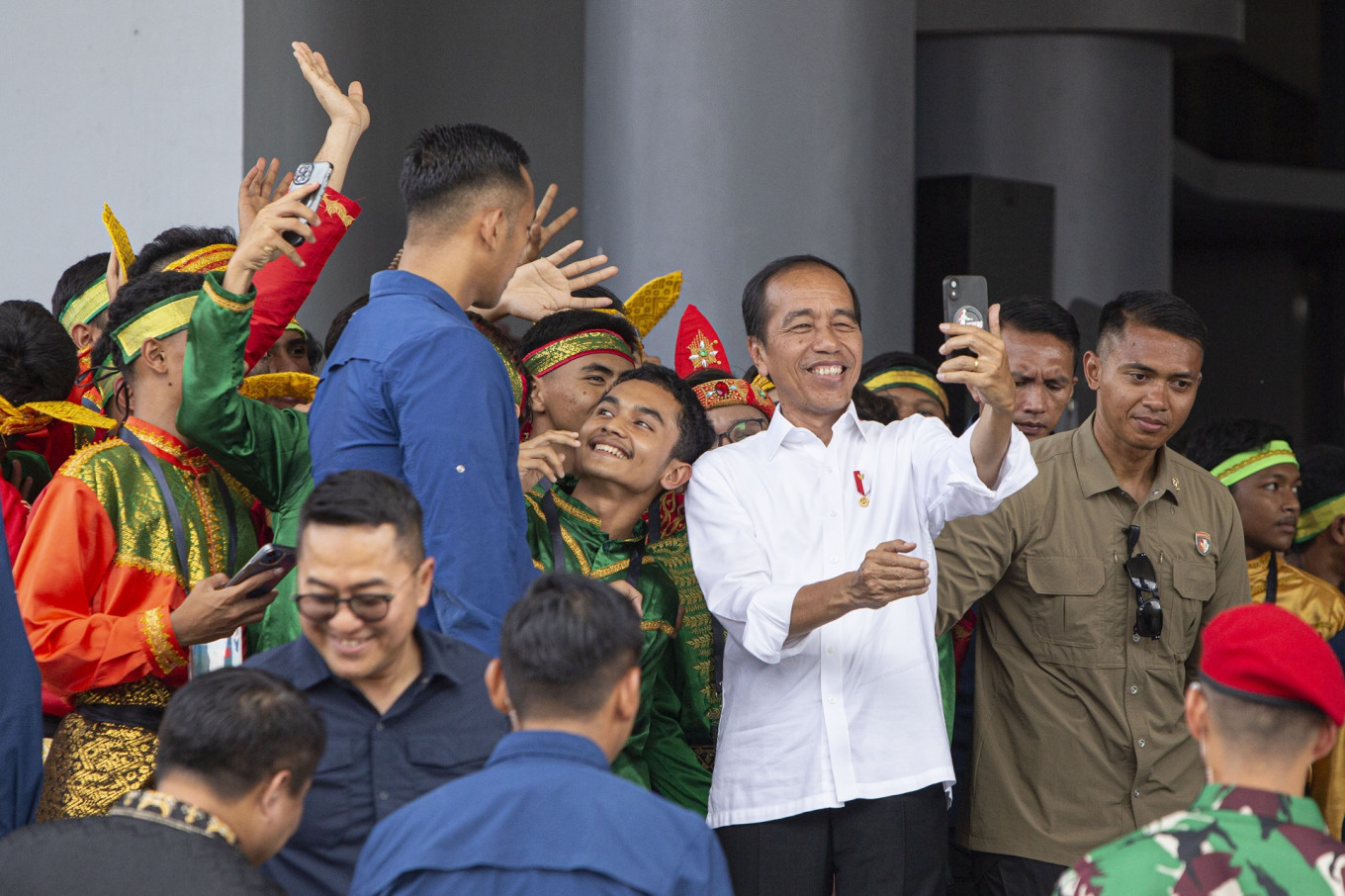Popular Reads
Top Results
Can't find what you're looking for?
View all search resultsPopular Reads
Top Results
Can't find what you're looking for?
View all search resultsThe end of an era
In the last few years of his administration, Jokowi set a dangerous precedent that future leaders may be tempted to emulate. And the impact on the political perspectives of the nation’s youth is equally worrying, as they may lose their appreciation for democracy, subordinating that precious and fragile gift to naked self-interest.
Change text size
Gift Premium Articles
to Anyone
W
hen we say goodbye to the administration of President Joko “Jokowi” Widodo tomorrow, the nation’s emotions will be mixed. Many will remember him as the captain who bravely steered the country through rough seas for a decade, but others will bid him good riddance, recoiling at the mess he has left behind.
Jokowi entered national politics in 2014 as a relative novice, but he quickly won the hearts of the electorate, who were yearning for a leader who was willing to listen to ordinary people and break down the barrier separating the elites from the masses. His campaign tagline “Jokowi is us” conjured a powerful image that voters took to heart.
Time magazine joined in the enthusiasm, dubbing Jokowi “a new hope” for the country who promised to break with the past to combat corruption, reform the bureaucracy and protect human rights.
Many of those promises went up in smoke as Jokowi displayed increasingly authoritarian tendencies as his presidency progressed. With the support of three quarters of the House of Representatives, he simply practiced the tyranny of majority to enact the policies he desired.
The Job Creation Law is among the most controversial pieces of legislation of Jokowi’s legacy. On the first attempt, the law was annulled by the Constitutional Court for its rushed deliberation without meaningful public input. After some superficial nods to public participation, the law was passed, bringing major changes to the country’s regulatory system and dismantling key environmental and labor protections.
Revisions to the Corruption Eradication Commission (KPK) Law and the Criminal Code added insult to injury, undermining the country’s fight against graft and restricting freedom of expression, respectively.
Jokowi exercised the power he consolidated to dismantle, rather than to fix, the system. It will be hard to forget the political maneuvering of his agents to extend his presidential tenure by means of a constitutional amendment under the flimsy pretense of policy continuity.
Jokowi has denied allegations of such interference, but his support for the Constitutional Court’s decision to relax candidate age limits simply to allow his son Gibran Rakabuming Raka to run for vice president in the February election, as Prabowo Subianto’s running mate, indicates his appetite for power beyond his presidential tenure.
Worse, Jokowi used the power at his disposal to help Prabowo and Gibran win the race, claiming that as a citizen, he had the right to choose a side. During the campaign season, Jokowi boosted social aid distributions to lower-income families, but the Constitutional Court failed to find a political motive behind the move, despite the allegations of Prabowo’s electoral rivals.
In the last few years of his administration, Jokowi set a dangerous precedent that future leaders may be tempted to emulate. And the impact on the political perspectives of the nation’s youth is equally worrying, as they may lose their appreciation for democracy, subordinating that precious and fragile gift to naked self-interest.
After handing the mantle to Prabowo tomorrow, Jokowi may not embark upon the restful retirement in his home town of Surakarta, Central Java, that he has suggested. For one, his investment has paid off, with Gibran in the nation’s second-highest office and a number of allies in top positions in the Prabowo administration.
State Secretary Pratikno, who has been with Jokowi since 2014, and Budi Ari Setiadi, chairman of Jokowi volunteer group Projo, to name a few, will remain in the cabinet amid promises of continuity from the Jokowi government. That means Jokowi’s influence will remain.
But whether Jokowi, like the old Javanese kings, will depart from the public sphere for a life of noble contemplation, only he knows.











